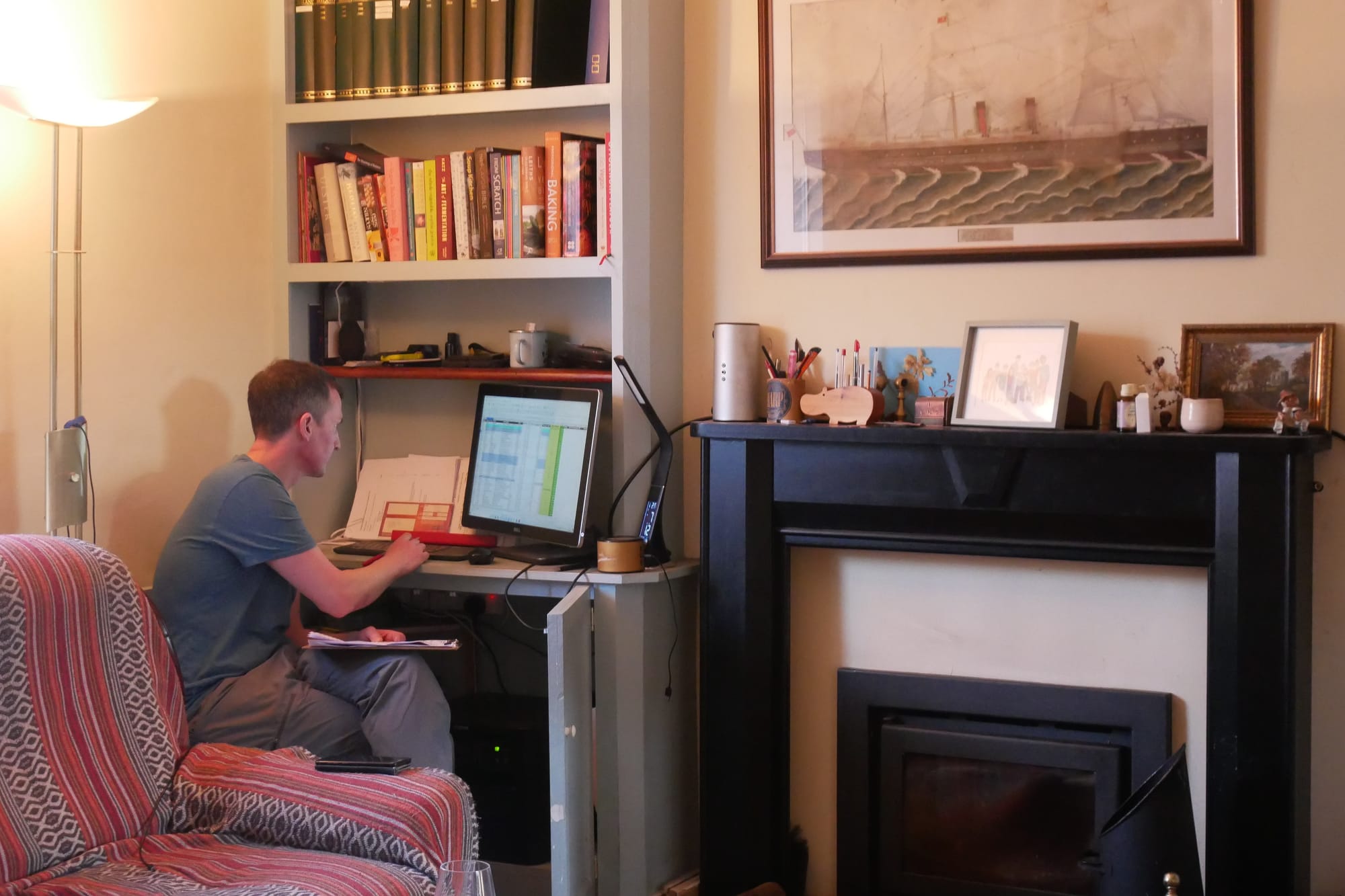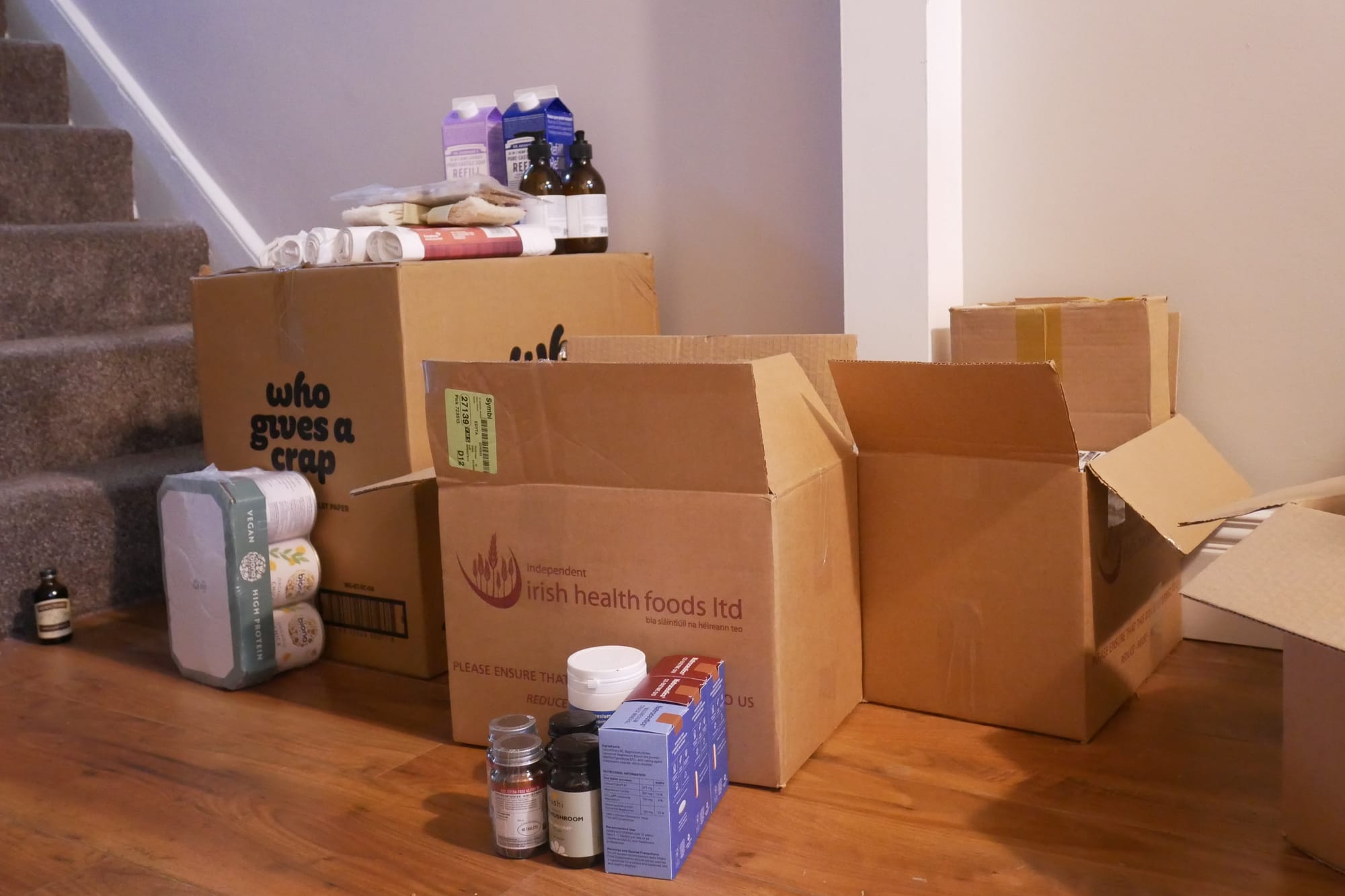What’s the best way to tell area residents about plans for a new asylum shelter nearby?
The government should tell communities directly about plans for new asylum shelters, some activists and politicians say.
“More people, definitely. We need more people,” says Barry Bryan, who thought up and started Symbi.

The boxes, bags and jars stacked alongside and under and on top of the hallway table are yet to be sorted.
On the wooden floor, a sack of currants sits on cans of organic tomatoes. There are jars of organic tempeh and three-fruit marmalade, and packs of coconut palm sugar.
“Do you want to take the pasta?” says Barry Bryan. He picks through the plenty all around.
“Well, I loooove pasta,” says Luke Sherlock, sounding as if he was rubbing his belly even though he wasn’t.
Sherlock is only stopping for a minute. He still has his bike helmet on and his sunglasses hooked over his t-shirt collar.
He is here to pick up some of his mother’s monthly order, made through Symbi, a community buyers’ group with a base in this terraced townhouse on Bayview Avenue in North Strand.
Bryan and Sherlock search out what his mother has ordered and debate what Sherlock can carry and what his mum can pick up another time.
Sherlock drops a small black rucksack onto the table. He stuffs in 10 bags of pasta, turning them to jigsaw them in.
Below the table are two five-litre jerry cans of conditioner and shampoo. Hmmm, his mum could grab those later, he says.
Bryan is easy, he’s flexible.
Byran set up Symbi, this community buyers’ group, in the summer of 2021, he said later on Thursday evening.
He was jobless at the time but that didn’t stop him caring about the food he bought, he says. “I wanted to buy organic.”
Only, it’s expensive. “I couldn’t afford it,” he says.
He had lived for a few years in Cloughjordan, the ecovillage in County Tipperary set up as a model of sustainable living, and it had a buyers’ group which let people pool their shopping orders and so pay less.
“I just thought, sure, we could do that here,” he says.
He dropped letters through doors along Bayview Avenue to see who was interested, and put a message in a local WhatsApp group.
A few people replied. “Just a handful, you know,” he says.
Darina Breen, a neighbour with a background in nutrition and food technology, learnt about the group through the street’s WhatsApp, she says.
Helen Sherlock says she spotted a poster outside of the zero-waste grocer Small Changes, just as the outlet was closing in Drumcondra.
His brother and sister, who live nearby in Cabra and Glasnevin, got involved too. Four years on, Symbi now has 20 members scattered about the city.
By cutting out shop overheads, members get a discount running from 10 percent to 50 percent on products when compared to the costs at mainstream supermarkets, says Bryan.
Greater affordability motivates some members. “You need money to be healthy and environmental and it’s such a pity,” says Sharon Keogh, who lives in Crumlin. “It makes it more accessible.
But Keogh and others point to further plusses.
“It is convenience,” says Breen, an early adopter who has suffered for years with allergies and long searches for the right food.
It also helps to cut down on plastic, she says. “To me, community has always meant a light footprint on the earth.”
That, says Helen Sherlock, is why she orders shampoo and conditioner by the five-litre jerry can.
Members can split orders too to cut out packaging, she says, an option she hasn’t used yet but plans to check out.
People are also looking around their communities and trying to work out what they can do in the current climate, says Keogh. “People want more alternative options to the status quo.”
On Thursday evening, Bryan sat at the kitchen table next to a window that was wide open onto a big blue sky and a backyard chicken run.
Bryan paused before answering the question of why, for him, it is so important to buy organic. He rubbed the back of his neck and looked down for a while.
“It’s just like because the planet is dying,” he said quietly. “It’s a life form and it’s dying. It’s just the one thing we can do.”
Symbi works like this.
The wholesaler issues prices for products. Byran shares that info directly with group members and they get choosing, and an order goes in once a month. Then the delivery comes in and members pick up what they ordered.
For a long time, members plugged what they wanted into an Excel order sheet.
But navigating a spreadsheet with 8,000 items was off-putting for some, says Bryan. “My brother was like, it’s like shopping from a telephone directory.”

So they recently upgraded the website, he says. It now looks more like a supermarket website, with product images, categories, and a simple checkout.
“That was a big thing,” says Bryan. It should also help Symbi attract more members – which he really wants.
“More people, definitely. We need more people,” he says.
Bryan says he worries people imagine they would have to buy food or cleaning products by the tens of kilos. But you can buy singles, a tub of ice cream or a jar of jam at a time, he says.
Keogh says it’s a challenge for people to change shopping habits when life is so busy. But, “it’s just making the change. I think once they do that, there’s no going back.”
With more members, they could offer even more, says Byran. “If we can get, I don’t know, we could grow to maybe 100 members, we could get fresh produce.”
A farmer has said they would be willing to sell fruit and vegetables to them wholesale like they do restaurants if they could order more, he said. “We could do it weekly, as opposed to monthly.”
He has thought a lot about what should be available through Symbi, and what healthy food means, he says, and hasn’t quite pinned it down.
But Symbi does want to weed out disingenuous producers on its list, he says. And cut down even more on the plastic too, he says.
He pulls out a box of Ecover dishwasher tablets from below the kitchen sink, a few metres from the table. Each square is individually wrapped in plastic.
“They could do better and they’re not,” says Bryan. He opens a box of Ocean Saver tabs, and turns one around in his fingers. It is wrapped in a biodegradable polymer.
It is great already that members get affordable healthy food and products, says Bryan. “If that’s all that it ever is then that would be great.”
In that sense, it can’t fail. “It can’t really fail,” he says, almost to himself. “It can’t really fail. But it could be so much more.”
In the corner of the living room is a big computer screen open onto the spreadsheet of orders for this month, some rows marked up in blue, and columns highlighted in green and yellow.
Almost a decade ago, Trinity College Dublin researchers catalogued and mapped food-sharing in Dublin as part of its ShareCity database.
Its research doesn’t mention any group pooling together to shop.
Yet the idea seems such a no-brainer, says Keogh. “Things can happen and then it can be, oh my God, it’s just so obvious. It’s like one of those things.”
Bryan says a pinch of luck helped him set up. He found a wholesaler willing to sell to a buyers’ group.
People had doubted he would, he says. “People were saying, I don’t think they’re going to talk to you.” Somehow, he talked Symbi in.
Buyers’ groups might also be rare because it takes work, says Helen Sherlock. Bryan puts in so much graft, she says.
“You need someone to take it on, dealing with suppliers and customers,” she says. “I’ve got the easy part of it.”
Bryan does really have such a strong value system when it comes to the environment, says Keogh. “And a lot of integrity around that.”
And she isn’t just saying that because she is his partner, she says sheepishly. “He’s not into making money. It’s not about that at all.”
Bryan talks about a dream for the group.
He doesn’t want Symbi, which is set up as a non-profit social enterprise, to have a leader or hierarchy, he says. “The dream is that Symbi would be its own living breathing entity.”
The group has set limits by saying Symbi offers healthy food, he says. But within that limit, he wants people to be free to act without direction from another member, he says.
“Symbi would be the result of all our actions,” says Bryan.
When Symbi needed to upload items from the 8,000-line list to the website shop, two members in Drimnagh volunteered, he said.
In exchange, they haven’t had to pay the small admin fee, which is waived if people spend time helping the group or taking a delivery, but is otherwise applied to orders to cover website hosting and training for members.
But also, he told them to just do it as they want, he says. “If they see something they don’t like, don’t put it up. Flag it in the Google Doc.”
In a hierarchy, Symbi would have had a working group assess which products are sustainable and write a report for bosses who would decide what to do – or let it sit on a desk.
In this flat organisation, whoever has the passion and knowledge to do a job just gets on and does that within the limits that the group sets, he says.
It’s also not about making money, not about pocketing billions, he says. “I think if you’re willing to give all the money to one person you shouldn’t be surprised when bad things happen and one person takes it over.”

Later that evening, Bryan knelt on the floor in the entrance hall, and flipped through the printed sheet of orders on a clipboard.
He started to split the delivery for more people to pick up. He put bags of strong white bread flour to one side against the wall, and a sachet of pink Himalayan sea salt to another.
As he sorts, he talks again about possible futures. When Symbi gets to 100 members, they could go to the food producers directly, he says, and cut out the wholesaler and another layer of mark-ups.
It might need 100 members, he says, with a laugh. “I’m just making that up. It could be less.”
He flicks through the print-out. “That one retails at €13,” he said, tapping with his red pen on a line that says €6.28.
“Oh, here’s a good one, €35 in the shops. And €16.50,” he says. He shakes his head and chuckles.
Get our latest headlines in one of them, and recommendations for things to do in Dublin in the other.